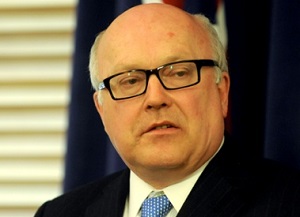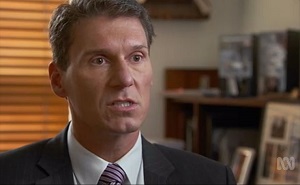 During the last week in March, before this blog came to life, Attorney General George Brandis introduced to parliament an exposure draft of changes to the S18c of the Racial Discrimination Act. Brandis goes beyond everyone’s “right to be a bigot”. He seeks effectively to protect the right of individuals, especially those working in the media, to use hate speech.
During the last week in March, before this blog came to life, Attorney General George Brandis introduced to parliament an exposure draft of changes to the S18c of the Racial Discrimination Act. Brandis goes beyond everyone’s “right to be a bigot”. He seeks effectively to protect the right of individuals, especially those working in the media, to use hate speech.
Much of the discussion and commentary has been in terms of free speech. I agree with Mark that this is to mistake fundamentally the aim of legislation against hate speech.
Its purpose is to provide redress against harm, harm felt by specific individuals and groups.
It’s not about freedom of speech. It protects speech which is justified on several grounds – including literary and artistic merit (so the argument about Salman Rushdie is entirely specious). It’s about not doing harm through the expression of hateful speech.
If we consider the effects of actually existing racism (or any other form of hate), it doesn’t take too much reflection to see that hurt leads to harm pretty quickly – it’s demonstrable in the impacts of hate speech on identity and thus wellbeing, and there’s a path from wounded identity to self harm, even suicide. (My bold)
Comments on the draft are now being considered by the Government. There’s a whisper that they reconsidering, but the question is still open. You can send Abbott/Brandis a message by signing this petition against hate speech.
In the following section I’ve laid out the nuts and bolts of the proposed changes.
Proposed changes to S18c
Simon Rice explains that the current test for racial vilification is “conduct causing offence, insult, humiliation or intimidation”. Offence, insult and humiliation have been dropped in the proposed changes. Verboten now is an act which is reasonable likely
(i) to vilify another person or a group of persons; or (ii) to intimidate another person or a group of persons.
Intimidate means to cause fear of physical harm:
(i) to a person; or (ii) to the property of a person; or (iii) to the members of a group of persons.
Vilify means to incite hatred against a person or a group of persons.
For an act to be unlawful it must must be “otherwise than in private” and must be done
“because of the race, colour or national or ethnic origin of that person or that group of persons.”
So the focus is now to be on vilification and intimidation (causing fear of physical harm). It’s OK to cause offence, insult and humiliate.
Vilification and intimidation are permissible if they involve:
words, sounds, images or writing spoken, broadcast, published or otherwise communicated in the course of participating in the public discussion of any political, social, cultural, religious, artistic, academic or scientific matter.”
Reasonableness
“is to be determined by the standards of an ordinary reasonable member of the Australian community, not by the standards of any particular group within the Australian community.”
The actual feelings of the target person or group are irrelevant.
Acts are to be judged independently of their actual effects, rather on what their effects would be if perpetrated on some mythical average member of the dominant group in society.
Discussion
To me, humiliating someone means putting them down, diminishing their esteem in their own eyes and in the eyes of others. To do that on the basis of race, colour or national or ethnic origin is to cause personal and social harm, is racist and frankly appalling. It’s a form of bullying, is tantamount to violence and should be illegal.
Some might argue that to tell the truth can involve offence and insults. Nevertheless I would argue that to offend or insult someone in relation to race, colour or national or ethnic origin means that you regard them as defective or inferior on those grounds. Again harm is done and I have no difficulty in making such acts illegal.
Truth telling appears to have no relevance to Brandis’s notion of free speech. A person can be humiliated, in public, by someone telling a pack of lies, and that’s OK.
Hate speech, racial intimidation and vilification in the public sphere is acceptable in Brandis’s world. To quote Michelle Grattan
In other words, anything goes in the name of free speech, accurate or not.
Vic Alhadeff reminds us that we will never have completely free speech:
“The late Justice Lionel Murphy said: ‘Freedom of speech is what is left over after due weight has been accorded to the laws relating to defamation, blasphemy, copyright, sedition, obscenity, use of insulting words, official secrecy, contempt of court and parliament, incitement and censorship’.”
That’s eleven categories imposing limits on what we are permitted to say in public.
All in all Brandis has cooked a rather nasty brew, emanating I’m afraid from a rather nasty cook. Brandis should remember that the robustness of parliament has resulted in suicide attempts. He seems to want to live in “a world of unrestrained biffo all round”, to borrow a phrase from Grattan.
Penny Wong:
“I think George saying this is about the rights of the bigots really laid bare the philosophy behind these changes.
“For them, it seems to be an abstract philosophical or legal argument. For them it’s a game, it’s a debate about words and abstract principles.
“For people who have experienced racism, it is a deeply personal debate, and it’s actually a debate about real people and real hurt.
“It’s a debate about real people in Australia, what happens on our buses and our trains, in the pubs on the football fields and on our streets. It’s about the message that our parliament sends and what I find missing, apart from the very offensive things in the debate, is empathy and compassion.”
Brandis has struck a blow for bigots, especially one bigoted journalist – Andrew Bolt.
Elsewhere
That was Ben Eltham at New Matilda.
Dennis Altman at The Conversation
Cristy Clark at The Conversation


